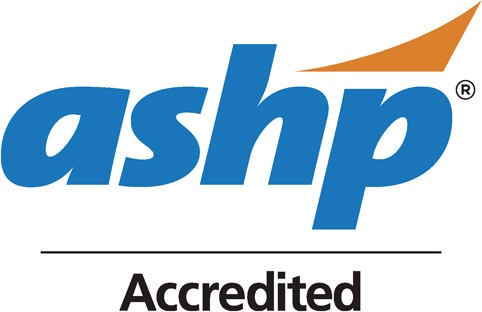SJ/C Clinical Pharmacy Residency Programs
St. Joseph’s/Candler offers a Postgraduate Year One (PGY1) residency program and Postgraduate Year Two (PGY2) clinical pharmacy residency programs in Critical Care, Emergency Medicine and Ambulatory Care.

St. Joseph's/Candler established the PGY2 program in Critical Care in 2011, Emergency Medicine in 2015 and Ambulatory Care in 2018. Critical Care and Emergency Medicine both offer one position. The Ambulatory Care program offers two positions. All programs are ASHP-accredited.
In addition to the traditional programs, St. Joseph's/Candler offers a non-traditional PGY1 program to current pharmacist employees, with up to two positions available during a three year period.
The SJ/C Clinical Pharmacy Residency Program is accredited by the ASHP.
Residency Program Mission
To provide quality, compassionate, cost-effective pharmaceutical care to patients treated at St. Joseph’s/Candler and to provide leadership on medication use and drug policy for patients and members of the health professions.
Residency Program Vision

To develop competent and confident clinical pharmacy practitioners and to instill in them a philosophy of excellence in practice leadership and management.
Residency Program Purpose
The PGY1 Pharmacy Residency builds on Doctor of Pharmacy education and outcomes to contribute to the development of clinical pharmacists responsible for medication-related care of patients with a wide range of conditions, eligible for board certification, and eligible for PGY2 pharmacy residency training.
The PGY1 program is a broad-based experience in general pharmacy practice to include nutritional support, internal medicine, critical care, cardiology, infectious diseases, hematology/oncology, emergency medicine, pharmacokinetics, ambulatory care, clinical research, performance improvement, medication safety and administration. Residents develop, present, and submit for publication a major research project. The resident will also complete a Graduate Teaching Certificate Program through the University of Georgia College of Pharmacy and serve as a preceptor for PharmD students completing clinical clerkship training on site. Upon completion of the program, the PGY1 resident will be prepared for successful entry into a PGY2 residency or a pharmacist position focused on direct patient care and will be qualified to provide pharmacist-managed medication therapy, rational utilization of medication, healthcare-related education, leadership and participation in interdisciplinary activities.
The PGY2 program in Critical Care Medicine builds on Doctor of Pharmacy (Pharm.D.) education and PGY1 pharmacy residency programs to contribute to the development of clinical pharmacists in specialized areas of practice. PGY2 residencies provide residents with opportunities to function independently as practitioners by conceptualizing and integrating accumulated experience and knowledge and incorporating both into the provision of patient care or other advanced practice settings. Residents who successfully complete an accredited PGY2 pharmacy residency are prepared for advanced patient care, academic, or other specialized positions, along with board certification, if available.
The PGY2 Critical Care Residency Program is designed to develop an advanced practitioner able to provide quality, compassionate, and cost-effective care to the critically ill patient through mutual cooperation with all members of the healthcare team. It is expected that residents will develop skills in advanced clinical pharmacy practice, adaptability, communication, assertiveness, professionalism, ethics, leadership, independence, and self-assessment which are suitable to the environment of critical care medicine.
The goal of the PGY2 Emergency Medicine residency is to train pharmacy practitioners who will be qualified to work in a variety of emergency medicine or critical care environments. Practice settings include the emergency departments at both hospitals, medical/surgical, neuro, and cardiac critical care units, trauma at Grady Hospital in Atlanta, and pre-hospital care with Chatham EMS. The resident will participate in a Graduate Certificate program through The University of Georgia receiving a Graduate Certificate upon completion. Teaching opportunities will include precepting PGY1 residents and PharmD students and didactic teaching via either distance learning or on-campus instruction.
The PGY2 program in Ambulatory Care provides residents with opportunities to function as independent practitioners and leaders within ambulatory care pharmacy. The resident is exposed to a variety of required and elective patient care services which may include anticoagulation, endocrinology, transitions of care, cardiology, practice management, primary care, academia, emergency medicine and infectious disease. The resident will also serve as a preceptor and mentor for PGY1 residents and PharmD students. Didactic teaching opportunities are also available based on interests. The program is based out of the Center for Medication Management and St. Joseph's/Candler Physician Network - Primary Care offices.
Clinical Pharmacy Department
St. Joseph's/Candler is a community health system with 714 beds divided between two anchor hospitals. The St. Joseph’s/Candler pharmacy department, functioning across both campuses, is highly automated and is comprised of approximately 100 staff members. Clinical pharmacist practitioners provide extensive services in several areas, including, but not limited to: internal medicine, critical care, infectious diseases, emergency medicine, oncology, cardiology, nutrition, primary care, anticoagulation and administration. The Center for Clinical Research maintains an active clinical research program that provides the resident with an opportunity to participate in both ongoing and new protocols.
Interviews
Interviews are an integral part of our evaluation of potential residents. We expect that serious applicants will want to evaluate us and our clinical site as well. On-site interviews in Savannah will be required for candidates selected to move forward in the application process. Deadline for receipt of completed application materials is January 4th for the PGY1 and PGY2 programs. All application materials must be completed in PhORCAS and received by the deadline in order to be considered for an interview.
For More Information
We are very excited about our residency programs and all that they offer. If you require further information or have questions please email us at gauld@sjchs.org for the PGY1 programs, carrjo@sjchs.org for the PGY2 Critical Care program, merritte@sjchs.org for the PGY2 Emergency Medicine program or keedyc@sjchs.org for the PGY2 Ambulatory Care program.